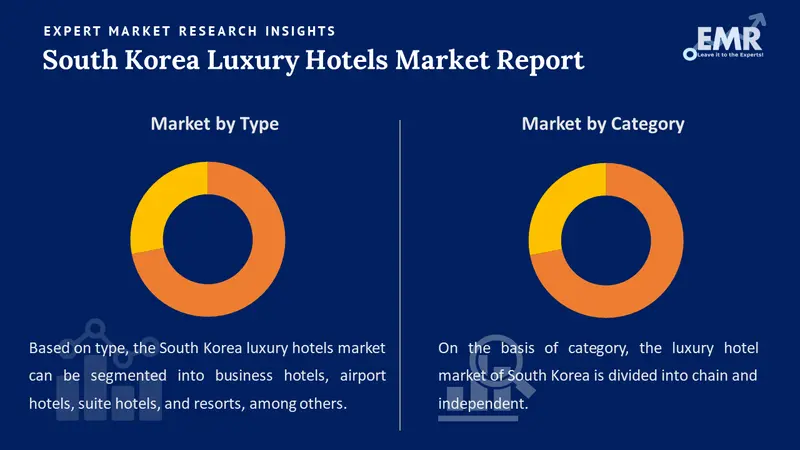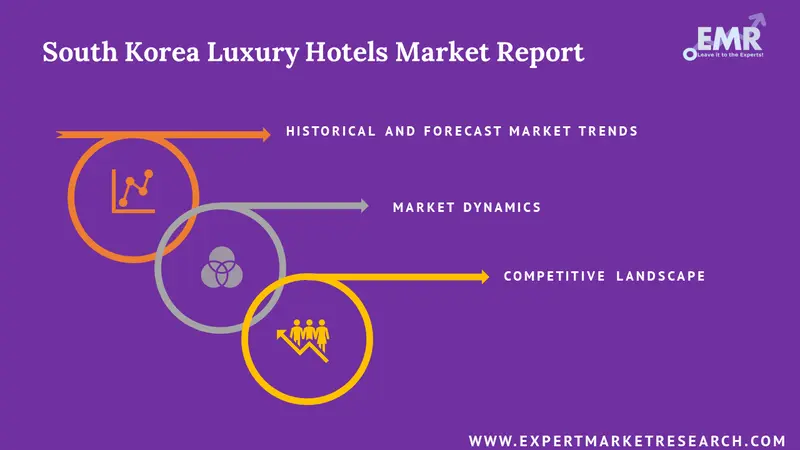
Consumer Insights
Uncover trends and behaviors shaping consumer choices today
Procurement Insights
Optimize your sourcing strategy with key market data
Industry Stats
Stay ahead with the latest trends and market analysis.
The South Korea luxury hotels market reached a value of approximately USD 2.90 Billion in 2025. The market is projected to grow at a CAGR of 5.60% between 2026 and 2035, reaching a value of around USD 5.00 Billion by 2035.
Base Year
Historical Period
Forecast Period
According to the WTTC, South Korea's Travel & Tourism GDP is projected to increase at an average annual rate of 4.8% by 2032.
According to USDA, Koreans' monthly per capita spending on HRI in 2022 rose to 141.83 USD increasing by 18.07% from 2021.
Key players are significantly focusing on improving their brand image in order to improve their market position.
Compound Annual Growth Rate
5.6%
Value in USD Billion
2026-2035
*this image is indicative*
The luxury hotels market in South Korea includes business hotels, airport hotels, suite hotels, and resorts. The surge in travel and tourism, particularly since BTS gained global popularity, has made South Korea a preferred destination over European and Western countries. National and international events organized by the government and corporations attract renowned guests, prompting a preference for luxury hotels due to their superior amenities.
The Hotel, Restaurant, and Institutional (HRI) food service sector exhibited signs of rebound following sales fluctuations amid the pandemic. In 2021, sector sales amounted to 150.76 trillion KRW (131.7 billion USD), marking a 7.77% increase from 2020 and a 4.41% rise from 2019.
Increasing sustainable practices in luxury hotels, expansion of the travel and tourism sector, improved online advertising and marketing, and rising disposable incomes are the major trends impacting South Korea luxury hotels market growth.
Luxury hotels in South Korea, like JW Marriott Seoul, respond to sustainability demands by aiming for LEED Gold certification, conserving resources, and enhancing guest experience.
Tourism and travel sector growth spur demand for upscale accommodations, driving expansion in the luxury hotel market to meet the needs of discerning travellers.
Luxury hotels benefit greatly from strong branding and increased online ad spending, appealing to travellers seeking relaxation, particularly older adults, and newlyweds.
Rising disposable incomes increase consumer spending on luxury experiences, driving demand for upscale accommodations in the hospitality industry, particularly in the luxury hotel sector.
The luxury hotel industry benefits from robust branding and increased online ad spending, appealing to travellers seeking upscale experiences for relaxation, especially among older adults and newlyweds. High disposable incomes, convenient online booking, and elevated living standards drive spending on leisure activities, boosting market growth.
Expansion in tourism and changing living standards contribute to steady market growth. Sporting events also drive demand spikes, with hotels accommodating teams and fans. Luxury hotels offer tailored amenities like spas and gyms, while pet-friendly accommodations cater to the rising pet market and single-person households in South Korea.

Read more about this report - REQUEST FREE SAMPLE COPY IN PDF
“South Korea Luxury Hotels Market Report and Forecast 2026-2035” offers a detailed analysis of the market based on the following segments:
Market Breakup by Type
Market Breakup by Category
Independent hotels primarily benefit from being more individualised thus boosting the market growth
Independent hotels differentiate themselves by offering unique experiences tailored to specific target markets, though they are often perceived as more costly and exclusive compared to chains. Unlike chains, which prioritize standardized luxury, independent hotels prioritize individuality and focus on providing exceptional customer service tailored to each guest's needs.
They maintain guest profiles to track preferences and enhance offerings, particularly for repeat visitors. This personalized approach gives them a competitive edge, allowing them to anticipate and exceed customer expectations, fostering loyalty and satisfaction.
Chain hotels, on the other hand, have exceptionally high standards of service, but they often take a more standardised approach to providing for their guests, attending to their needs as they occur and making sure to provide professionalism and high-quality service throughout the chain hotels. Chains hotels provide more affordable prices and an impression of dependability that will entice a larger target market and drive the growth of the luxury hotel market in South Korea.

Read more about this report - REQUEST FREE SAMPLE COPY IN PDF
The companies are a provider of pharmaceutical sourcing and distribution services, delivering pharmaceutical products, business solutions, and value-added services that enhance access to healthcare.
Founded in 1973, Hotel Lotte manages hotel properties and operates various businesses including hotels, duty-free shops, theme parks, resorts, and related ventures, also offering short-term lodging services.
Founded in 1978, Grand Hyatt Seoul, a 5-star hotel near Itaewon and Myeongdong in Seoul, caters to both business and leisure travellers, offering luxury accommodations ideal for families as well.
Founded in 1985, with its headquarters in the United States, Conrad Hotels & Resorts, a luxury hotel brand, is a part of Hilton Worldwide, offering upscale accommodations and resorts worldwide.
Founded in 1979, their business focus revolves around two core areas: hospitality and estate services, complemented by subsidiaries including Aqua Planet, specializing in aquarium operations.
*Please note that this is only a partial list; the complete list of key players is available in the full report. Additionally, the list of key players can be customized to better suit your needs.*
Other South Korea luxury hotels market key players are Oakwood Premier, Pyeongchang Alpensia Resort, Josun Hotels & Resorts Inc., and ACCOR SA among others.




*While we strive to always give you current and accurate information, the numbers depicted on the website are indicative and may differ from the actual numbers in the main report. At Expert Market Research, we aim to bring you the latest insights and trends in the market. Using our analyses and forecasts, stakeholders can understand the market dynamics, navigate challenges, and capitalize on opportunities to make data-driven strategic decisions.*
Get in touch with us for a customized solution tailored to your unique requirements and save upto 35%!
The market was valued at USD 2.90 Billion in 2025.
The market is projected to grow at a CAGR of 5.60% between 2026 and 2035.
The revenue generated from the South Korea luxury hotels market is expected to reach USD 5.00 Billion in 2035.
The market is categorised according to the type, which includes business hotels, airport hotels, suite hotels, resorts, and others.
The market key players are Hotel Lotte Co., Ltd., Grand Hyatt Seoul, Conrad Hotels & Resorts, Hanwha Hotels & Resorts, Oakwood Premier, Pyeongchang Alpensia Resort, Josun Hotels & Resorts Inc., and ACCOR SA among others.
Based on the category, the market is divided into chain and independent.
Explore our key highlights of the report and gain a concise overview of key findings, trends, and actionable insights that will empower your strategic decisions.
| REPORT FEATURES | DETAILS |
| Base Year | 2025 |
| Historical Period | 2019-2025 |
| Forecast Period | 2026-2035 |
| Scope of the Report |
Historical and Forecast Trends, Industry Drivers and Constraints, Historical and Forecast Market Analysis by Segment:
|
| Breakup by Type |
|
| Breakup by Category |
|
| Market Dynamics |
|
| Competitive Landscape |
|
| Companies Covered |
|
Datasheet
One User
USD 2,499
USD 2,249
tax inclusive*
Single User License
One User
USD 3,999
USD 3,599
tax inclusive*
Five User License
Five User
USD 4,999
USD 4,249
tax inclusive*
Corporate License
Unlimited Users
USD 5,999
USD 5,099
tax inclusive*
*Please note that the prices mentioned below are starting prices for each bundle type. Kindly contact our team for further details.*
Flash Bundle
Small Business Bundle
Growth Bundle
Enterprise Bundle
*Please note that the prices mentioned below are starting prices for each bundle type. Kindly contact our team for further details.*
Flash Bundle
Number of Reports: 3
20%
tax inclusive*
Small Business Bundle
Number of Reports: 5
25%
tax inclusive*
Growth Bundle
Number of Reports: 8
30%
tax inclusive*
Enterprise Bundle
Number of Reports: 10
35%
tax inclusive*
How To Order

Select License Type
Choose the right license for your needs and access rights.

Click on ‘Buy Now’
Add the report to your cart with one click and proceed to register.

Select Mode of Payment
Choose a payment option for a secure checkout. You will be redirected accordingly.
Strategic Solutions for Informed Decision-Making
Gain insights to stay ahead and seize opportunities.

Get insights & trends for a competitive edge.

Track prices with detailed trend reports.

Analyse trade data for supply chain insights.

Leverage cost reports for smart savings

Enhance supply chain with partnerships.

Connect For More Information
Our expert team of analysts will offer full support and resolve any queries regarding the report, before and after the purchase.
Our expert team of analysts will offer full support and resolve any queries regarding the report, before and after the purchase.
We employ meticulous research methods, blending advanced analytics and expert insights to deliver accurate, actionable industry intelligence, staying ahead of competitors.
Our skilled analysts offer unparalleled competitive advantage with detailed insights on current and emerging markets, ensuring your strategic edge.
We offer an in-depth yet simplified presentation of industry insights and analysis to meet your specific requirements effectively.
Share